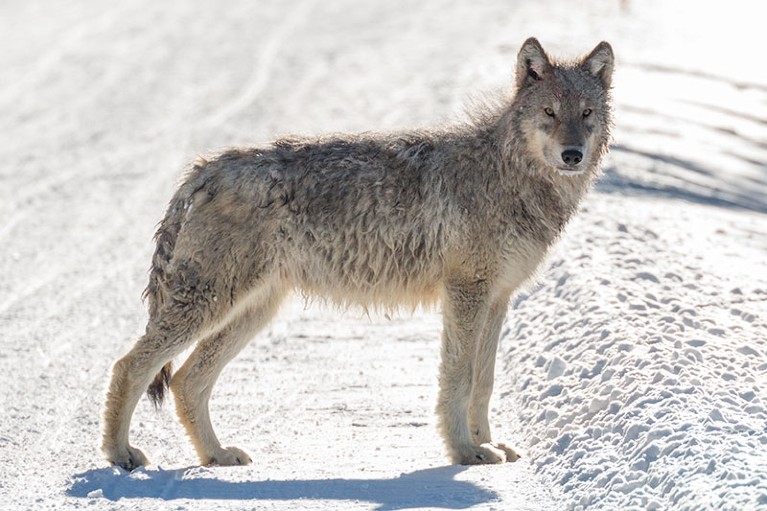Hello Nature readers, would you like to get this Briefing in your inbox free every day? Sign up here

Some wolves in Yellowstone National Park, Wyoming, share territory with cougars — and can become infected with their parasites.Credit: mtnmichelle/Getty
Wolves infected with a parasite that commonly infects cats are more likely to become leaders of the pack or strike out on their own. In a data set spanning 27 years, wolves in Yellowstone National Parkthat were infected with Toxoplasma gondii were 46 times more likely to become pack leaders and 11 times more likely to start a new pack than were uninfected animals. “Parasites might have a much larger role than anyone generally gives them credit for,” says wildlife ecologist and study co-author Connor Meyer.
Nature | 4 min read
Reference: Communications Biology paper
The European Space Agency’s (ESA) ExoMars mission is back on track after it secured a reported €360 million (US$375-million) investment from European countries. The money will allow ESA to start designing a new landing platform intended to lower its first Martian rover onto the planet’s surface. The work is necessary because ESA severed ties with its former partner on the mission, the Russian space agency Roscosmos, in March, after Russia’s invasion of Ukraine. Russia was in charge of designing and building landing gear for the rover, as well as launching the mission from its site in Baikonur, Kazakhstan.
Nature | 4 min read
Features & opinion
Table of Contents
In Bones and Bodies, forensic anthropologist Alan Morris takes us on a journey to the past, revealing racist interpretations of historically important fossils and artefacts related to the origin of humanity. “The tour is fascinating, demoralizing and insightful,” writes reviewer Fatimah Jackson, a biological anthropologist. “Combing through more than 100 years of scholarship, Morris lays bare how anthropologists built a ‘scientific’ justification for the low status they afforded peoples of African descent, particularly in South Africa, and how this justification became part of a systematic effort to ensure African peoples’ disenfranchisement.”
Nature | 6 min read
Aerosols are the miasma of soot (black carbon), sulfur dioxide, organic carbon and other compounds that drives poor air quality over many of the world’s most-populated regions. Studies show that this toxic smog strongly affects the likelihood of extreme precipitation events, such as those that contributed to Pakistan’s deadly floods in June this year. But estimates of impending risk ignore this big player in regional change and climate extremes. “Worse, it is not clear whether aerosols are set to rise, fall or stabilize,” write three experts in aerosol–climate interaction, climate impacts and scenario development.
Nature | 9 min read
In the latest short stories for Nature’s Futures series:
• The generations react very differently to the news that we’re all living in a simulation in The future will not be any% glitchless.
• A man lives with haunting ‘what-ifs’ after a quantum experiment goes wrong in Entanglement.
Satellite navigation has revolutionized how humans find their way. However, these systems often struggle in urban areas, where buildings can interfere with weak satellite signals. This week the Nature Podcast explores an alternative, satellite-free navigation system based on mobile-phone signals, which could improve applications that require precise positioning in cities, such as self-driving cars.
Nature Podcast | 24 min listen
Subscribe to the Nature Podcast on Apple Podcasts, Google Podcasts or Spotify.
